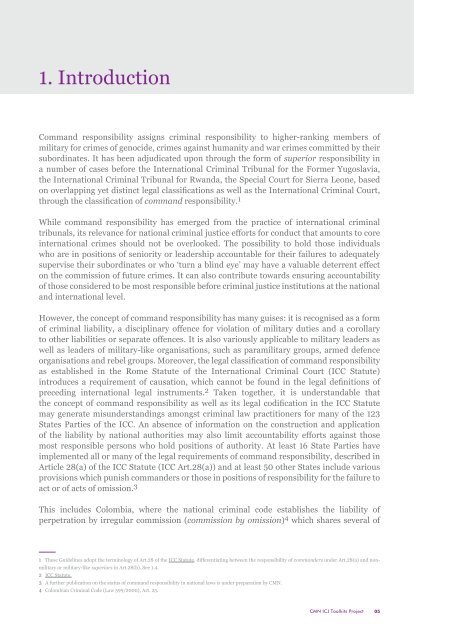Command Responsibility
CMN_ICL_Guidelines_Command_Responsibility_En
CMN_ICL_Guidelines_Command_Responsibility_En
Create successful ePaper yourself
Turn your PDF publications into a flip-book with our unique Google optimized e-Paper software.
1. Introduction<br />
<strong>Command</strong> responsibility assigns criminal responsibility to higher-ranking members of<br />
military for crimes of genocide, crimes against humanity and war crimes committed by their<br />
subordinates. It has been adjudicated upon through the form of superior responsibility in<br />
a number of cases before the International Criminal Tribunal for the Former Yugoslavia,<br />
the International Criminal Tribunal for Rwanda, the Special Court for Sierra Leone, based<br />
on overlapping yet distinct legal classifications as well as the International Criminal Court,<br />
through the classification of command responsibility. 1<br />
While command responsibility has emerged from the practice of international criminal<br />
tribunals, its relevance for national criminal justice efforts for conduct that amounts to core<br />
international crimes should not be overlooked. The possibility to hold those individuals<br />
who are in positions of seniority or leadership accountable for their failures to adequately<br />
supervise their subordinates or who ‘turn a blind eye’ may have a valuable deterrent effect<br />
on the commission of future crimes. It can also contribute towards ensuring accountability<br />
of those considered to be most responsible before criminal justice institutions at the national<br />
and international level.<br />
However, the concept of command responsibility has many guises: it is recognised as a form<br />
of criminal liability, a disciplinary offence for violation of military duties and a corollary<br />
to other liabilities or separate offences. It is also variously applicable to military leaders as<br />
well as leaders of military-like organisations, such as paramilitary groups, armed defence<br />
organisations and rebel groups. Moreover, the legal classification of command responsibility<br />
as established in the Rome Statute of the International Criminal Court (ICC Statute)<br />
introduces a requirement of causation, which cannot be found in the legal definitions of<br />
preceding international legal instruments. 2 Taken together, it is understandable that<br />
the concept of command responsibility as well as its legal codification in the ICC Statute<br />
may generate misunderstandings amongst criminal law practitioners for many of the 123<br />
States Parties of the ICC. An absence of information on the construction and application<br />
of the liability by national authorities may also limit accountability efforts against those<br />
most responsible persons who hold positions of authority. At least 16 State Parties have<br />
implemented all or many of the legal requirements of command responsibility, described in<br />
Article 28(a) of the ICC Statute (ICC Art.28(a)) and at least 50 other States include various<br />
provisions which punish commanders or those in positions of responsibility for the failure to<br />
act or of acts of omission. 3<br />
This includes Colombia, where the national criminal code establishes the liability of<br />
perpetration by irregular commission (commission by omission) 4 which shares several of<br />
1 These Guidelines adopt the terminology of Art.28 of the ICC Statute, differentiating between the responsibility of commanders under Art.28(a) and nonmilitary<br />
or military-like superiors in Art.28(b). See 1.4.<br />
2 ICC Statute.<br />
3 A further publication on the status of command responsibility in national laws is under preparation by CMN.<br />
4 Colombian Criminal Code (Law 599/2000), Art. 25.<br />
CMN ICJ Toolkits Project 05


